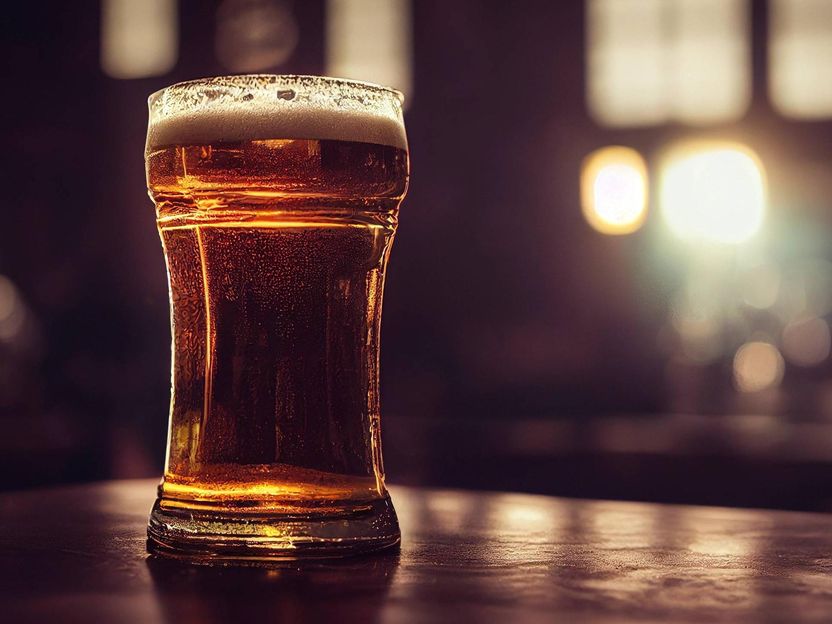Germany's oldest beer scientifically analyzed
Study reveals molecular profile of 19th century beer sample
After almost 140 years, researchers at the Technical University of Munich (TUM) opened a lager beer that had been kept at room temperature throughout in order to analyze it. The beer, dating from 1885, has now been characterized sensorially and analytically. The findings provide insight into the technological aspects of historical beer brewing.

computer generated picture
A historic beer from the time of the German Empire was recently found in northern Germany. Its chemical composition offers unique insights into the brewing culture of the late 19th century, when groundbreaking innovations laid the foundation for industrial beer production. Researchers at the TUM attested that the beer sample was in good storage condition and had a long shelf life. The beer bottle was sealed with cork, wire and wax and stored upright and under atmospheric pressure in a commercial building.
Sensory analysis by four certified tasters revealed a coherent and balanced beer that contained aromas of sherry, port and plum. "It was very harmonious in overall impression and bitterness. Overall, it's a very lean, elegant, harmonious beer that still smells and tastes quite excellent," says Dr. Martin Zarnkow, head of technology and development at the Weihenstephan Research Center for Brewing and Food Quality.
Insights into the molecular composition of beer
In collaboration with the Comprehensive Foodomics Platform led by Prof. Philippe Schmitt-Kopplin at the Chair of Analytical Food Chemistry, the molecular profile of German Imperial beer was comprehensively analyzed. The study shows that, apart from a strong oxidation of the hop components, the signature of the historical beer is comparable to modern, industrially brewed beers. The individual production steps of malting and brewing, such as wort preparation, fermentation, filtration and storage, leave detectable molecular imprints.
The researchers compared the chemical signature of the beer sample with the molecular profiles of 400 modern, national and international beers and classified the sample as a typical light lager. Distinguishing features of the analysis were the type of beer, the type of fermentation, compliance with the purity law, the grain used and the signature of the Maillard reaction. The latter is essential for the aroma and color of the beer and was detectable in a high concentration in the historical beer sample. The matching has created "a database that now makes it possible to understand the technology behind a product. Something we have been doing for a long time but have not been able to do on such a statistically sound basis," says Dr. Martin Zarnkow.
The beginnings of modern industrial beer brewing
By comparing the historical and modern molecular references, the scientists drew conclusions about the brewing methods of the 19th century. This revealed that lager beer was brewed using a bottom-fermenting process. This production process prefers a temperature of a few degrees Celsius and only became practicable year-round with the invention of Linde's cooling apparatus in the 1870s. Microbiological analysis determined that the beer was filtered. This occurred in 1885, a few years after the invention of the first filtration apparatus. A low lactic acid concentration in the beer sample and the role of niacin as an indicator compound for insufficient sterilization provided the researchers with further insights into historical brewing.
In addition, the scientists:inside found that the beer was brewed in northern Germany according to the purity law. This came as a surprise to Dr. Zarnkow, since the beer comes from a region that would not have had to brew according to the Reinheitsgebot at the time. "But it was brewed according to the Reinheitsgebot and completely conformed to the characteristics published at the time - except for the color," Zarnkow said.
Note: This article has been translated using a computer system without human intervention. LUMITOS offers these automatic translations to present a wider range of current news. Since this article has been translated with automatic translation, it is possible that it contains errors in vocabulary, syntax or grammar. The original article in German can be found here.
Most read news
Topics
Organizations
Other news from the department science

Get the food & beverage industry in your inbox
By submitting this form you agree that LUMITOS AG will send you the newsletter(s) selected above by email. Your data will not be passed on to third parties. Your data will be stored and processed in accordance with our data protection regulations. LUMITOS may contact you by email for the purpose of advertising or market and opinion surveys. You can revoke your consent at any time without giving reasons to LUMITOS AG, Ernst-Augustin-Str. 2, 12489 Berlin, Germany or by e-mail at revoke@lumitos.com with effect for the future. In addition, each email contains a link to unsubscribe from the corresponding newsletter.



























































